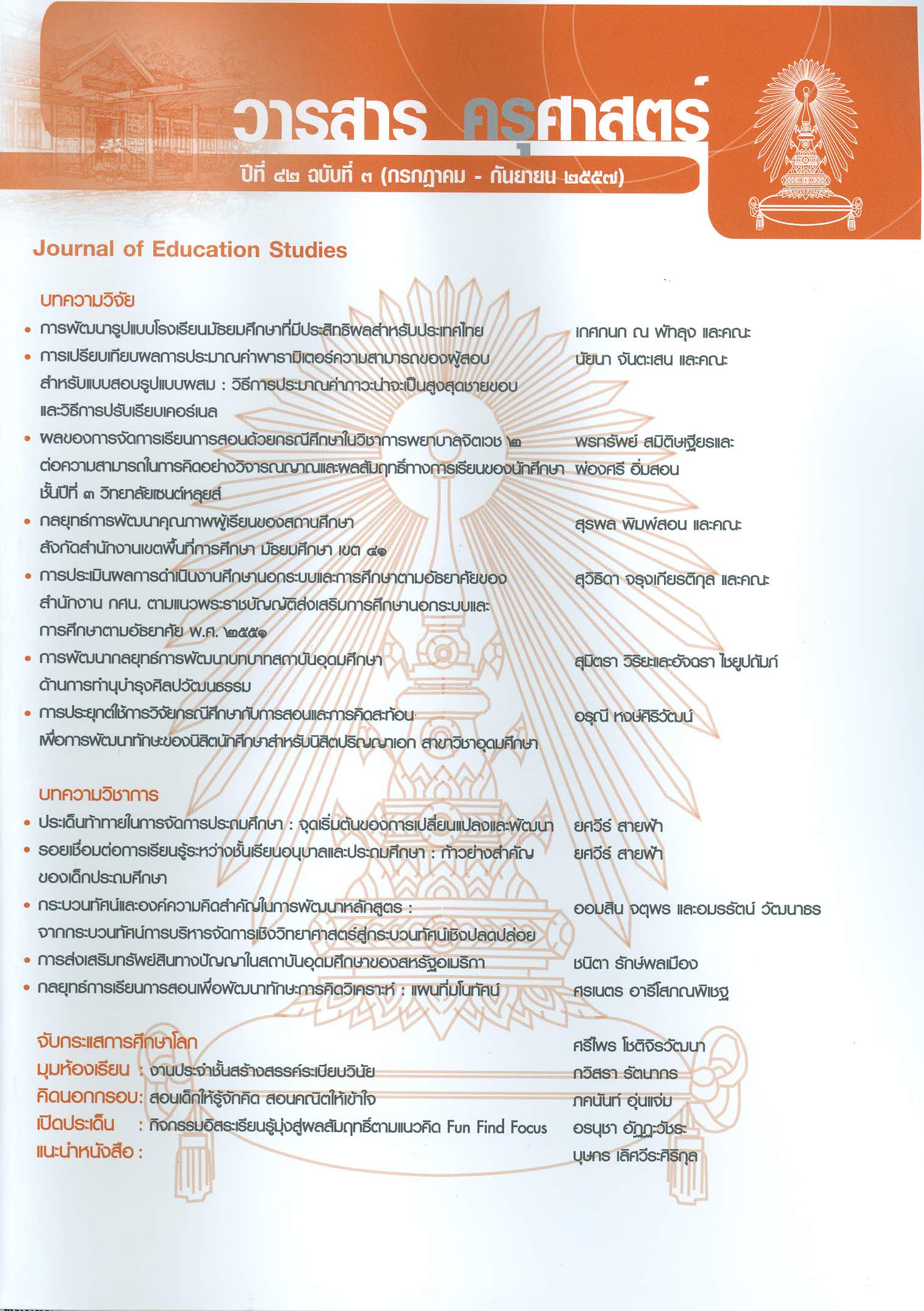กระบวนทัศน์และองค์ความคิดสำคัญในการพัฒนาหลักสูตร: จากกระบวนทัศน์การบริหารจัดการเชิงวิทยาศาสตร์ สู่กระบวนทัศน์เชิงปลดปล่อย
Keywords:
ศาสตร์ด้านหลักสูตร, การพัฒนาหลักสูตร, กระบวนทัศน์, ทฤษฎีเชิงวิพากษ์, CURRICULUM STUDIES, CURRICULUM DEVELOPMENT, PARADIGM, CRITICAL THEORYAbstract
บทความฉบับนี้มีวัตถุประสงค์เพื่อนำเสนอกระบวนทัศน์การพัฒนาหลักสูตรในปัจจุบัน โดยทฤษฎี หลักสูตรและการพัฒนาหลักสูตรสามารถจำแนกออกเป็น ๓ กระบวนทัศน์ ได้แก่ ๑) กระบวนทัศน์ เชิงเทคนิค/กระบวนทัศน์เชิงวิทยาศาสตร์ ๒) กระบวนทัศน์เชิงปฏิบัติ และ ๓) กระบวนทัศน์เชิงปลดปล่อย แม้ว่าทั้ง ๓กระบวนทัศน์จะมีวิวัฒนาการทางความคิดและฐานทางทฤษฎีโดยทั่วไปแตกต่างกัน แต่ก็มิได้ แยกขั้วออกจากกันอย่างเด็ดขาดชัดเจน กระบวนทัศน์การพัฒนาหลักสูตรนั้นสามารถบ่งบอกถึงลักษณะ ของวิธีวิทยาการวิจัยที่เริ่มต้นจากกระบวนทัศน์ที่เน้นระเบียบวิธีวิจัยเชิงปริมาณไปสู่ระเบียบวิธีวิจัยเชิง คุณภาพ นอกจากนั้นความแตกต่างอันเป็นพื้นฐานสำคัญของทั้ง ๓ กระบวนทัศน์ ล้วนเป็นปัจจัยที่ส่งผล ให้นักวิจัยและนักวิชาการด้านหลักสูตรดำเนินการพัฒนาหลักสูตรตามกระบวนทัศน์ที่ตนเองยึดถือ แตกต่างกัน การศึกษาทฤษฎีหลักสูตรและการพัฒนาหลักสูตรจึงควรให้ความสำคัญกับการวิเคราะห์ กระบวนทัศน์พื้นฐานที่ส่งผลให้ศาสตร์ด้านหลักสูตรมีพลวัตและการเปลี่ยนแปลงบนฐานทฤษฎีมากกว่า การวิเคราะห์ถึงจุดอ่อนต่างๆ เพราะจุดอ่อนเหล่านั้นมิใช่อุปสรรค หากแต่เป็นการเสริมพลังให้ศาสตร์ ด้านหลักสูตรมีความแข็งแกร่งยิ่งขึ้นต่อไป
This article aims at describing curriculum paradigm in the f ield of curriculum studies today. Curriculum theory and curriculum development can be generally classif ied into three paradigms: technical-scientif ic, practical, and emancipatory paradigms. Although broad and general distinction can be made among these three perspectives, they do not exist separately from one another. Each also demonstrates the characteristics of research methodologies, spanning the continuum from quantitative to qualitative research methodologies and that the fundamental differences between these three paradigms is a major factor accounting for the different ways in which researchers and curriculum scholars approach the task of curriculum design. The study of curriculum theory and curriculum development should be approached by analyzing paradigmatic assumptions which make it theoretically dynamic and powerful rather than analyzing what does not work in the f ield. This is not a weak but rather a theoretical empowerment.




